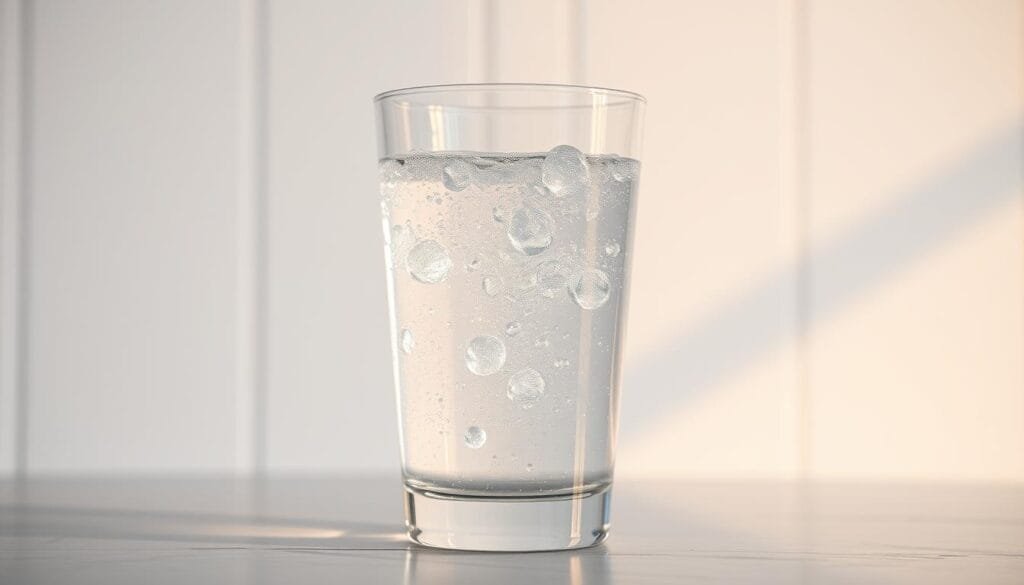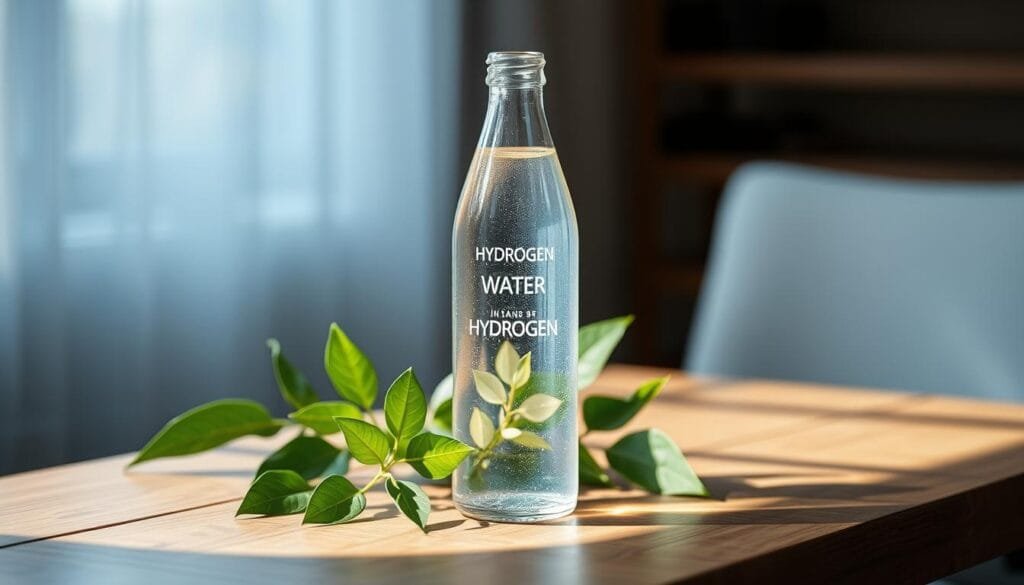Currently Empty: RM0.00
Curious whether a bottle labeled with dissolved H2 will feel different in your mouth? Many people ask this and expect a clear answer. The quick reality is that molecular gas has no smell or flavor, so any sensation often comes from the base liquid, minerals, or tiny bubbles.
Consumers describe the drink as smooth, crisp, or clean, while others find it like regular water. A 2018 trial found no obvious sensory difference between enriched and placebo samples. Properly prepared liquid is not fizzy and should not taste metallic.
This introduction sets expectations for what follows: a plain definition, how human senses judge mouthfeel, and the factors that shape perception—source, minerals, containers, and timing. It also notes that Wellness Concept can answer local queries via WhatsApp at +60123822655 during business hours.
Key Takeaways
- Molecular hydrogen is tasteless: perceived changes come from the base liquid and bubbles.
- Sensory reports vary: some find it silkier, others see no difference.
- Credible tests show mixed results on noticeable flavor changes.
- Factors like mineral profile, filtration, and container matter more than the gas itself.
- Wellness Concept offers local guidance via WhatsApp during posted hours.
Sipping the Question: What Readers Really Mean by “Does hydrogen water taste?”
Readers often mean something practical—does the bottled product change mouthfeel, aftertaste, or sip-to-sip consistency?
Most people compare hydrogen water with their usual bottle and want a plain answer. Reports vary: some describe a lighter, crisper mouthfeel or a silky finish. Others notice no change at all.
- Many use words like crisp, clean, or silky to describe subtle flavor shifts.
- Expectations depend on base water quality and recent production—those are the main factors.
- If someone already drinks high-quality filtered water, the perceived difference may be minimal.
Online accounts vary, which is normal for sensory topics. A short trial at home in Malaysia is the fastest way to see if any change matters to an individual. The section that follows explains why impressions differ and what influences them.
What Is Hydrogen Water and Why Its Taste Can Seem Different
A simple addition of dissolved gas can change how a sip feels, even when chemistry suggests no flavor is present.
Hydrogen water is drinking water that contains dissolved molecular hydrogen (H2). The gas itself is odorless and tasteless, so most perceived change comes from other factors.
Molecular hydrogen and dissolved gas basics
Tiny bubbles behave differently from carbonation. They may alter mouthfeel or a sense of lightness without producing fizz. This explains reports of a “silky” or crisp finish.
Terminology and production methods
Hydrogen-rich water (HRW) is used alongside common names. Production routes include electrolysis units, portable generators, and tablets. Each method yields varying dissolved content and bubble size.
- Filtration and mineral profile shape the drink’s baseline.
- Production method affects gas levels per unit and mouthfeel.
- At least one trial found no detectable difference versus placebo.
Users in Malaysia report mixed impressions, which aligns with the science: sensation depends more on base liquid and delivery method than on the gas itself.
Sensory Profile: How Hydrogen-Rich Water Is Commonly Described
Many drinkers report a subtly different mouthfeel that feels lighter on the palate.
Smoother mouthfeel: A frequent note is a silky texture and a crisp, refreshing finish. Tiny bubbles can add a fleeting lift without fizz or added flavor.
Lighter, crisper notes: Some describe a faint sweetness or a clean profile. When mineral content is low, the result often tastes neutral to “pure,” which users link to good filtration rather than the gas itself.
Why no change is felt: Many people detect no difference versus their usual filtered bottle. Prior habits—like drinking hard or mineral-rich supplies—can make any shift seem more obvious.
| Descriptor | Common Report | Likely Cause |
|---|---|---|
| Silky texture | Often | Tiny bubbles / delivery method |
| Pure profile | Sometimes | Low mineral content |
| No change | Many | Similar base liquid or placebo effect |
Practical tip: taste side-by-side with a familiar bottle to judge differences objectively.
Does hydrogen water taste? The Science Behind Perception

Tasteless, odorless gas and the role of tiny bubbles
Molecular hydrogen is odorless and tasteless. Any change in mouthfeel comes from tiny bubbles, dissolved gases, or the base mineral profile.
Small bubbles can lift the palate and create a lighter sensation without carbonation or a metallic note.
Taste buds, olfaction, and individual sensitivity
Taste relies on five basic receptors; smell shapes much of what a person calls flavor. Two people can sip the same glass and report different impressions.
Sensitivity, prior drinking habits, and mineral levels in the bottle influence perceived differences more than the gas itself.
What studies and consumer tests suggest today
Controlled trials found participants often could not distinguish enriched samples from placebo by taste.
“No detectable taste difference was reported in at least one controlled trial.”
At the same time, many users report a smoother mouthfeel, and higher concentration or fresher content can amplify that lightness.
- Freshness window: best sensation ~4–8 hours if sealed and cool.
- Non-carbonated: properly made product is not fizzy or metallic.
- Try side-by-side: simple tasting helps spot real differences.
Factors That Change the Taste: Source, Minerals, and Hydrogen Concentration
Source water and mineral balance set the stage for how a sip feels before any gas is added. Hard supplies with higher mineral content tend to give a mineral-forward note. Soft or well-filtered water feels cleaner and more neutral.
Base quality and mineral content
Mineral content shifts mouthfeel. Higher calcium or magnesium can make a bottle feel fuller. Low mineral content often reads as “pure” or crisp.
Concentration and perceived lightness
Concentration is measured in ppm or mg/L. Some users report a lighter, slightly sweeter finish when levels exceed 1.6 ppm. Lower levels usually match familiar filtered bottles.
Production methods and consistency
Electrolysis units, portable hydrogen water bottles, and tablets produce different concentrations and bubble sizes. SPE/PEM designs aim to boost usable hydrogen and cut unwanted byproducts, which helps preserve a clean profile.
Containers, storage, and freshness
Glass or stainless-steel bottles protect flavor better than plastic. Temperature and sealing matter: best sensory quality is often within 4–8 hours if kept cool and closed.
- Practical tip: buyers should check independent test results for concentration and unit price when comparing models for sale in Malaysia.
- When base water is already well-filtered, perceived differences may be subtle—side-by-side tasting helps decide.
For more background on health-related topics and local guidance, see the hydrogen water for heart health page.
Choosing and Enjoying Hydrogen Water in Malaysia
Practical steps make it easy to pick a reliable unit that holds tested levels and fits daily routines in Malaysia.

How to pick a hydrogen water bottle or generator
Look for independent test data on ppm and consistent performance. Compare typical ppm ranges, maintenance needs, and price per unit. For shoppers on a budget, check sale offers and an advertised usd price to compare value.
Best practices for consistency
Drink soon after production. Consume within 4–8 hours and keep the liquid cool and sealed. Use glass or stainless-steel bottles to avoid odd notes. Make smaller batches to keep freshness and repeat a side-by-side sip test at home.
Local help from Wellness Concept
Wellness Concept offers demos, guidance, and post-sale support in Malaysia. Contact via WhatsApp at +60123822655 for product demos, comparisons of water bottles and generators, and help with maintenance questions.
- Tip: properly made hydrogen water should not be fizzy or metallic—off notes usually mean the base supply or container needs attention.
- Business hours: Mon–Fri 9:30 am–6:30 pm; Sat–Sun 10 am–5 pm.
Conclusion
To conclude, subtle shifts in mouthfeel come from the bottle and handling, not a new flavoring agent. Hydrogen water is fundamentally drinking water with dissolved gas, so perceived differences arise from bubbles, mineral balance, production method, and storage.
Evidence on taste is mixed: at least one controlled study found no detectable difference, while many users report a smoother, silkier sip and a clean profile. Consider benefits and health claims separately from sensory effects.
Try a side-by-side sample with familiar filtered liquid to judge for yourself. For local advice, demos, pricing or questions about unit price and price per model in usd, message Wellness Concept on WhatsApp at +60123822655 during business hours. Thank you for reading and feel free to request a tasting demo in Malaysia.
FAQ
What do people mean when they ask if hydrogen water tastes different?
They usually want to know about flavor, mouthfeel, and any noticeable contrast with regular bottled or tap water. Many ask whether dissolved gas or added minerals change the experience, or whether a special bottle, generator, or tablet alters texture or sweetness.
Is the dissolved H2 itself responsible for any flavor?
No. Molecular H2 is colorless, odorless, and essentially tasteless. If users detect a difference, it more often comes from tiny bubbles, mineral content, or storage conditions rather than the gas molecule.
How do people commonly describe the sensory profile of hydrogen-rich water?
Consumers often report a smoother, slightly silkier mouthfeel and a crisp, light finish. Others note a subtle clean sweetness when base water has low mineral content. Some people detect no change at all.
What factors usually create perceived differences in flavor or texture?
Base water quality (hard vs. soft), mineral concentration, hydrogen level (measured in ppm or mg/L), production method (electrolysis bottles, generators, or tablets), and container type all affect perception. Temperature and how soon the water is consumed after production also matter.
Does higher concentration of molecular H2 make the drink taste stronger?
Higher levels may enhance the feeling of lightness or create more microbubbles, but they don’t add a distinct flavor. Perceived strength usually ties back to texture rather than a new taste component.
Can storage or container material change the drinking experience?
Yes. Glass and stainless steel preserve freshness best and limit gas loss. Plastic can leach flavors and allow H2 to escape faster. Drinking within the freshness window after production preserves mouthfeel and any subtle effects.
How do production methods affect what someone senses?
Electrolysis generators and dedicated bottles typically create consistent levels of dissolved gas and tiny bubbles. Tablets rely on effervescence and can introduce mineral salts or additives that change flavor. Lab-tested hydrogen levels help predict consistency.
Are there reliable tests or labels to verify hydrogen content?
Yes. Reputable brands provide ppm or mg/L readings verified by third-party labs. Buyers should look for tested hydrogen levels and clear production method details when choosing a bottle or generator.
If someone notices no difference, is that normal?
Absolutely. Individual sensitivity, taste bud variation, and the base water’s mineral profile mean many people perceive no change. Not detecting a difference doesn’t reflect product quality.
What practical tips improve consistency and flavor perception?
Use high-quality base water, choose glass or stainless containers, drink soon after production, and compare products with lab-verified hydrogen levels. For tablets, rinse taste expectations against any added minerals or sweeteners.
Where can consumers in Malaysia get guidance or demos for hydrogen water products?
Wellness Concept offers product guidance, demos, and support. They can be reached via WhatsApp at +60123822655. Business hours are Mon–Fri 9:30 am–6:30 pm and Sat–Sun 10 am–5 pm.


